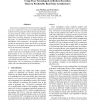5 search results - page 1 / 1 » Sampling Dead Block Prediction for Last-Level Caches |
MICRO
2010
IEEE
13 years 2 months ago
2010
IEEE
Last-level caches (LLCs) are large structures with significant power requirements. They can be quite inefficient. On average, a cache block in a 2MB LRU-managed LLC is dead 86% of ...
MICRO
2009
IEEE
13 years 11 months ago
2009
IEEE
Cache blocks often exhibit a small number of uses during their life time in the last-level cache. Past research has exploited this property in two different ways. First, replacem...
ISCA
2002
IEEE
13 years 9 months ago
2002
IEEE
Techniques for analyzing and improving memory referencing behavior continue to be important for achieving good overall program performance due to the ever-increasing performance g...
IEEEPACT
2009
IEEE
2009
IEEE
Soft-OLP: Improving Hardware Cache Performance through Software-Controlled Object-Level Partitioning
13 years 11 months ago
—Performance degradation of memory-intensive programs caused by the LRU policy’s inability to handle weaklocality data accesses in the last level cache is increasingly serious ...
RTAS
2008
IEEE
13 years 10 months ago
2008
IEEE
Instruction scratchpads have been previously suggested as a way to reduce the worst case execution time (WCET) of hard real-time programs without introducing the analysis issues p...

